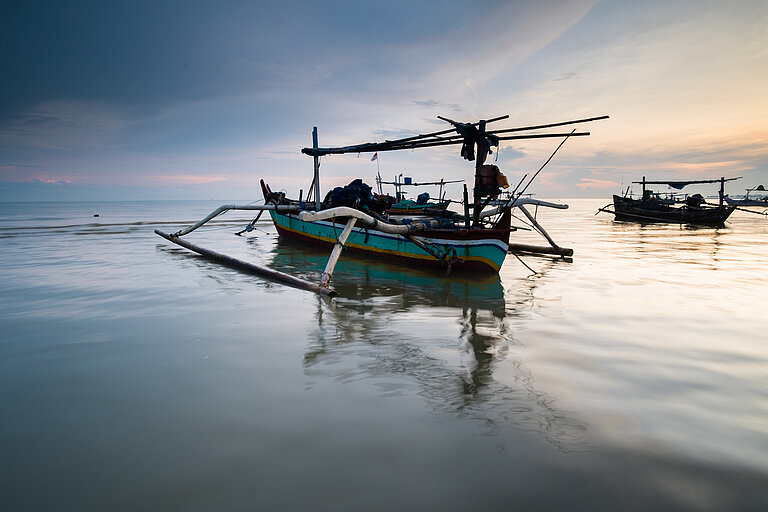Golden rules for fish stock conservation
30 International Experts Call for a Redefinition of Sustainable Fishing
An international group of 30 leading ocean researchers has introduced a ground-breaking redefinition of the term “sustainable fishing”. The experts propose eleven “Golden Rules” that fundamentally challenge the flawed notion currently prevailing in fisheries management and aim to promote the renewal of global fish stocks. Their study, titled “Rethinking sustainability of marine fisheries for a fast-changing planet”, is published today in the scientific journal npj Ocean Sustainability.
“Business as usual has failed dramatically, as visible in the increasing number of stocks and fisheries that have collapsed, due to mismanagement,” says Dr Rainer Froese, a biologist and fisheries expert at the GEOMAR Helmholtz Centre for Ocean Research Kiel who was involved in the study.
For a new direction, the researchers outline two guiding principles: A truly sustainable fishery must minimise impacts on marine species and habitats, adapt to climate change, and enable the regeneration of depleted marine life and ecosystems. At the same time, it must support and enhance the health and resilience of people and communities – especially the most vulnerable among us –rather than primarily benefiting large corporations that tightly steer profits to owners and shareholders while offloading costs onto others.
Golden Rules for a Sustainable Future
With their eleven “Golden Rules”, the authors provide a roadmap for the transition to a sustainable and socially equitable fishery. This includes measures such as the establishment of protected areas, the reduction of bycatch and destructive fishing methods, as well as the support of artisanal fisheries and the adaptation of catch quotas to climate change.
“We must view fishing as a privilege rather than a right. Marine life is a public good that should benefit both society and nature, not be the object of a resource race driven by economic interests," emphasises lead author Professor Dr Callum Roberts, a marine biologist at the University of York. “Our work advocates for fisheries that preserve the vital functions of ocean ecosystems, mitigate climate change, guarantee food security, and respect human rights,” adds Professor Dr Daniel Pauly from the University of British Columbia.
The scientists assert that their proposals are ambitious yet realistic, with most recommended actions rooted in proven successful practices. Dr Froese states: “Our fish grow quickly if we just let them. If we fish two to three years less, we can then sustainably enjoy more fish in the long term. However, this is only possible as long as stocks have not collapsed.”
Scientifically Obsolete Understanding of “Sustainability”
The researchers warn against an outdated approach to the so-called sustainability of fishing, which has been largely adopted by both governments and private actors in recent decades. Callum Roberts: “It relies on a simplistic, productivist theory which assumes that as long as global catch volumes remain below a set limit, anyone can fish just about anything, anywhere, with any method”. This has primarily benefited capital-intensive industries in the Global North, while ecosystems have been damaged, artisanal fisheries have been threatened, and the food security of millions has been put at risk.
Supermarkets Also Bear Responsibility
The scientists urge policymakers, retailers, and fisheries managers to acknowledge the failings of current fishing practices and prioritise the adoption of the proposed rules. They emphasise the responsibility of supermarkets, which are responsible for nearly two-thirds of seafood sales in Europe. They can influence fishing practices through their sourcing policies, scrutinise sustainability labels, and respond to consumers' growing concerns about the hidden impacts of their food.
Original publication:
Roberts, C., Béné, C., Bennett, N. et al. Rethinking sustainability of marine fisheries for a fast-changing planet. npj Ocean Sustain 3, 41 (2024). doi.org/10.1038/s44183-024-00078-2
About the group of authors
The article is the result of the collaboration of thirty authors from a wide range of academic disciplines, from biology and oceanography to social sciences and economics, representing many nationalities and based in many different countries: Australia, Canada, Cuba, France, Germany, Mexico, Norway, Portugal, Switzerland, the United Kingdom, the United States and Uruguay.
Funding
This scientific effort was funded by the Levine Family Foundation, a British philanthropic organization dedicated to restoring ocean health.

'Put humans before profits' is one of the guiding principles of the study: Fishery managers must prioritize equity alongside sustainability, and establish equitable resources allocation processes, ensuring Indigenous Peoples and small-scale fishers’ rights are considered first. Photo: AdobeStock
![[Translate to English:] A large fish swims in turquoise water](/fileadmin/_processed_/4/f/csm_Dorsch_AdobeStock_189656355_357a55d156.jpeg)
Cod stocks have collapsed in the western Baltic Sea - specimens like this can only be admired in aquariums. Photo: AdobeStock
![[Translate to English:] Portrait of an elderly man](/fileadmin/_processed_/f/6/csm_RainerFroese_c_JanSteffen_GEOMAR_21513c487c.jpg)
"Business as usual has failed dramatically": Dr Rainer Froese, biologist at GEOMAR and co-author of the study. Photo: Jan Steffen, GEOMAR


